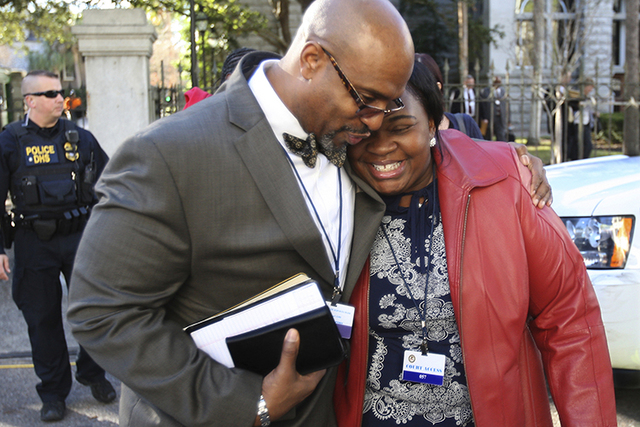Grief and anger fill courtroom as Dylann Roof formally sentenced to death
CHARLESTON, S.C. — It wasn’t just the family members of the nine people Dylann Roof killed in a Charleston, South Carolina, church who suffered. Their church family grieved too.
Along with the 32 family members of victims, three people connected to Emanuel AME Church spoke as Roof was formally sentenced to death Wednesday in federal court.
“When you have attended nine wakes and nine funerals, it is heartbreaking,” said Ruby Martin, the most senior member of the church who admitted it took her several weeks after the 2015 shootings before she could go back.
There were laughter and tears; love and hate; anger and forgiveness; despair and hope at Wednesday’s hearing. Some shouted at Roof, wishing him to be condemned to hell. Others offered forgiveness and one said she would visit him in prison as he awaits execution for the slaughter.
A jury sentenced Roof to death Tuesday on hate crime and obstruction of religion charges. U.S. District Judge Richard Gergel couldn’t change it, but his words left little doubt he felt death was justified. “This hate, this viciousness, this moral depravity will not go unanswered,” he said.
The 22-year-old avowed white supremacist didn’t look at Gergel, just like he refused to meet the gaze of anyone who spoke Wednesday, including Janet Scott, an aunt of 26-year-old Tywanza Sanders, the youngest victim killed in the June 17, 2015, massacre.
“Dylann,” Scott said quietly as she started speaking. “Dylann! DYLANN!” she said, shouting it the last time. Toward the end of her remarks, she said, “I wish you would look at me, boy.”
Scott talked about her nephew’s “great big heart,” which could not be donated because of the police investigation.
Roof didn’t take an opportunity to speak Wednesday. The day before, just before jurors deliberated his sentence, he didn’t ask for mercy or apologize, instead saying he still “felt like I had to do it.”
Some of the relatives looked directly at Roof. Others chose to look at jurors, who did not have to be in court Wednesday but told the judge they wanted to attend.
Sheila Capers, the sister-in-law of Cynthia Hurd, said she prayed for Roof’s soul to be saved.
“If at any point before you are sentenced and you’re in prison and you want me to come and pray with you, I will do that,” Capers said.
Felicia Sanders, who survived the attack, brought the bullet-torn, bloodstained Bible she had with her the night of the shooting. She told Roof he still lives in her head, and that when she hears a balloon pop or fireworks or even the soft thud of a falling acorn, she returns to that night.
“Most importantly, I can’t shut my eyes to pray,” Sanders said.
On the night of the shooting, Roof sat through a 45-minute Bible study session at the black church known as Mother Emanuel with 12 others. He opened fire as they stood and closed their eyes for a final prayer. In all, he fired 77 shots. Each victim was hit at least five times.
Three people survived. Roof told one of them he was sparing her life so she could tell the world he was killing the worshippers there because he hated black people.
When he was arrested, Roof told FBI agents he wanted the shootings to bring back segregation or perhaps start a race war. Instead, the slayings had a unifying effect as South Carolina removed the Confederate flag from its Statehouse for the first time in more than 50 years. Other states followed suit, taking down Confederate banners and monuments. Roof had posed with the flag in photos.
The jury convicted Roof last month of all 33 federal charges he faced. He insisted he was not mentally ill and did not call any witnesses or present any evidence.
Roof, who also faces murder charges in state court, plans to appeal the federal case. Prosecutors say he will remain jailed in Charleston until the state charges are resolved. No trial date has been set.

















